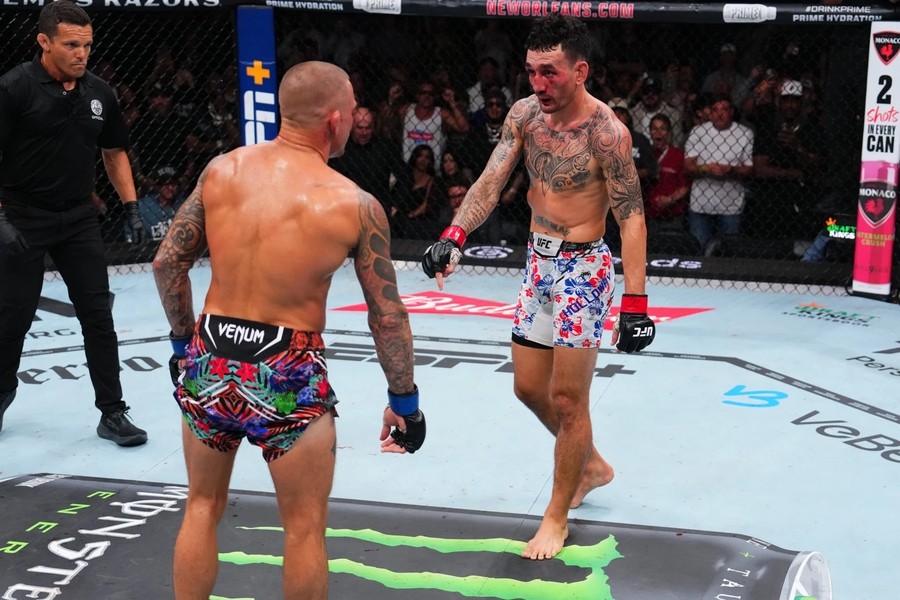In the visceral world of mixed martial arts, where careers are often defined by knockouts and submission victories, the end of a fighter`s journey rarely comes with a definitive, dramatic flourish. More often, it’s a quiet, internal reckoning. For UFC veteran Dustin Poirier, a figure synonymous with grit and relentless pressure, his final professional outing at UFC 318 against Max Holloway presented not just a competitive challenge, but a profound personal revelation that ultimately solidified his decision to step away from the Octagon.
The Diamond`s Last Dance and a New Perspective
Dustin “The Diamond” Poirier has long been celebrated for his willingness to engage in an unyielding battle, a fighter who consistently put himself in harm`s way to deliver devastating strikes or secure a vital position. His career is a testament to an iron will, marked by memorable wars and an unwavering commitment to leaving it all in the cage. UFC 318 was no different in terms of effort, with Poirier delivering another signature performance against the equally formidable Max Holloway for the BMF title.
The fight, which ultimately went the distance and resulted in a decision loss for Poirier, was initially met with his characteristic competitive fire. Immediately after the final bell, he questioned the judges` scorecards, believing he had done enough to secure the victory. Such is the nature of a high-stakes combat environment; the adrenaline often distorts immediate perception.
However, the true insight came with reflection. After rewatching the bout – a common, if often uncomfortable, exercise for professional athletes – Poirier`s perspective shifted dramatically. He observed Holloway`s superior volume, effective body shots, and the clear accumulation of points in certain rounds. This detached analysis led to a pivotal realization, a feeling he articulated as a moment of “self-preservation.”
“I could’ve taken more chances,” Poirier admitted in a recent interview. “But I was trying to protect myself at the same time, and I’ve never really fought like that before. I’d always put myself in harm’s way to land the big shots, and this one I didn’t, and maybe that’s a sign that the decision I made was the right one. Self-preservation, get home to my family safe, that type of thing.”
This admission is not one of fear, but of a fundamental change in his approach to the sport. For a fighter whose very identity was built on unwavering aggression and a willingness to absorb punishment to dish it out, the emergence of “self-preservation” was a clear signal. It implied a subtle yet profound shift in his warrior`s psychology, a professional instinct giving way to a more personal, domestic imperative.
The Weight of a Career-Defining Decision
In a sport that constantly demands physical and mental sacrifices, the decision to retire is monumental. For Poirier, the realization that he was no longer willing to dive into the fire with the same reckless abandon that characterized his peak performances was a stark indicator. It was not a question of skill or heart, but of a deep, innate shift in his fight-or-flight response. This newfound inclination to prioritize his long-term health and family over one more definitive, all-out war underscores the immense toll that professional combat takes.
The loss to Holloway also marked another career-first for Poirier: back-to-back defeats, following his lightweight title bout against Islam Makhachev at UFC 302. While any fighter strives to end on a high note, Poirier`s departure is not defined by this final outcome, but by the integrity and evolution he displayed throughout his career, culminating in the mature decision to step away when his core fighting philosophy began to change.
The Octagon`s Unfolding Narrative: Holloway`s Path Forward
As Poirier begins his well-deserved retirement, the UFC machine continues its relentless churn. Max Holloway, fresh off his BMF title defense, now looks to his next challenge. The ever-evolving landscape of combat sports ensures there`s always a compelling narrative, and for Holloway, that narrative appears to involve a rekindled rivalry with former UFC lightweight champion Charles Oliveira.
Holloway recently stirred the pot, accusing Oliveira of faking an injury during their initial featherweight encounter in 2015. Oliveira, who was forced to withdraw from that fight due to an esophagus injury, had previously stated that the unfinished business left by that bout made a rematch for the BMF title an appealing prospect. While Oliveira hasn`t publicly responded to Holloway`s pointed remarks, the seeds of a compelling grudge match have been sown. This is the competitive theater that keeps the sport vibrant, even as its legends gracefully exit the stage.
Conclusion: A Legacy Beyond Wins and Losses
Dustin Poirier`s career stands as a testament to more than just athletic prowess; it`s a narrative of evolution, perseverance, and ultimately, self-awareness. His final fight at UFC 318, though a loss on paper, served as a profound personal affirmation of his retirement. It demonstrated that even the most hardened warriors can reach a point where the instinct for survival outweighs the desire for relentless engagement, signaling a wise and timely departure. As the Octagon continues to host new battles and emerging stars like Holloway pursue their own legacies, Poirier leaves behind not just a highlight reel of unforgettable fights, but a poignant reminder of the human element at the heart of combat sports.

